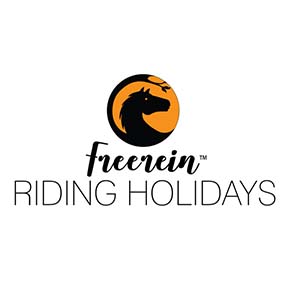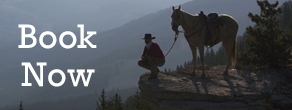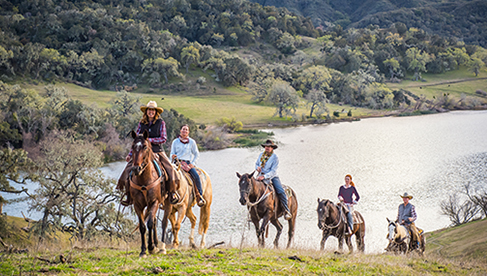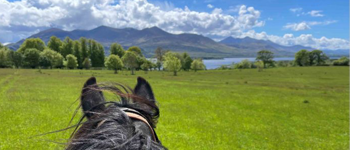Making Polo Accessible at Powers Polo School
Photographer Tami Weingartner visits Powers Polo School in Ohio, where women and young riders join their male counterparts and take to the field to learn to play polo.
by Tami Weingartner
When I showed to photograph the first match of the season at Darlington Polo Club I noticed a significant number of new players. I did a little investigative research to find out how the game is taught to both potential players and horses, where the players are coming from and how horses are sourced. It seemed only natural that I contact Juliette Powers, a third generation player who takes to the field with her father (Mark) and brother (Justin). Juliette is also involved in the familiy's Polo School, located between Pittsburgh, Pennsylvania and Cleveland, Ohio in East Palestine.

Tools of the trade for polo.
After a quick chat and some exchange of email we settled on a date that worked for us both. Upon arrival to the farm, I was met by Juliette. Mark was in the process of bailing hay and the students for the evening had not arrived yet. I took a few minutes to get my bearings and watch the horses grazing in the pastures and swatting flies. Juliette gave me a little primer on where there horses came from. Several of the horses are from Argentina, but the majority of the horses they use are horses that her dad, Mark, has gotten from the racetrack and retrained into polo horses.
When Mark joined us, the conversation shifted to new players. As I mentioned, there has been a surge of players at our local club. It's undeniable that Powers Polo School has made a significant impact on the number of new players coming and playing in Darlington on Friday nights. That is the trend in all other parts of the country as well, with a number of both new men as well as woman and young riders now playing alongside the more traditional seasoned male players. Many of those riders are students of the school.
Juliette spoke candidly about her level of play and where her comfort level is compared to her brother and the fact that there is room for different types of players on the field. Some players are more comfortable sticking with their man and foiling that players' attempts at controlling the ball. While others are more aggressive at ball handling.
Once the two students arrived for the evening, we headed to the barn to meet the horses and choose mounts. I was happy to see how each and every horse came forward with eager expressions. The horses they use at the school are a mix of retired Polo Ponies (upwards of 30 years old) for the youngest of riders to learn on as well as the horses that they are currently using during matches.
I have to admit that at this point, I was super excited to get the cameras out and start shooting. So after watching briefly while they tacked up, I walked out to the field to await horses and riders.

Horses are brought to the trailer and tied, just like on game days, in order to be groomed and tacked.
Once they arrived at the field, they warmed up players and horses. Then each instructor paired up with a student. They set polo balls on a cross section of the field and commenced with playing.
Mark and Juliet followed their students down the field calling out shots: offside forehand, near side backhand, near side forehand, neck shot, tail shot. They were also reminding them to stay with their man, giving words of encouragment and sharing laughs. Horses and riders settled into the steady communication with each other and continued to visibly improve as the lesson continued.

Clockwise from top: Juliet Powers riding retired polo pony Lisa. Mark calling out instruction to Pedro Alonso and Justin Stasney, Justin Stasney, Pedro Alonso.
Mark's level of skill and horsemanship struck me as particularly noteworthy. He was simultaneously training a young horse off the track (he and Ransom are participating in the Retired Racehorse Training Project Thoroughbred Makeover) and providing guidance to students. One student had only 6 weeks of experience riding, let alone playing polo. Another student had some horse experience from pushing cattle and limited polo experience. Juliette cantered around giving instruction on an retired horse who was clearly happy to still be working.

Mark Powers riding Ransom followed closely by Pedro.
Mark trotted by me and said "This is how we do it. Making horses and learning by playing and having fun."
Really I don't think it could be summed up better. There were lots of smiles, laughter and good natured camaraderie and although the horses certainly put their work in, they all went back to the barn with ears flapping and with nice relaxed swinging backs.

Mark on Ransom with Juliette attempting to hook the shot.
There is no real prerequisite for leaning polo. With schools like Powers Polo School that will teach you as well as rent horses out for chukkers at matches, even not owning a horse isn't a barrier to entry. A large number of new players come to the sport every year having no horse experience at all and take to both riding and playing quickly. Woman and young riders alike should feel comfortable learning and playing alongside established male players.

Justin Stasney riding Luke.
Polo for me as a photographer is the ultimate equestrian sport to photograph. Enthusiasm and passion for the game is demonstrated so freely by both players and horses. I'm happy to see women and young riders joining their male counterparts and taking to the field.
How you can go: Learn more about the Powers Polo School, located on the farms of Mark and Paul Powers in East Palestine, Ohio, where there is a regulation-size grass polo field (home to countless games since the 1970s), the stables and a new outdoor riding arena for beginner polo lessons.
If you live elsewhere, the US Polo Association is a resource for both polo lessons and to find out where you can watch a polo match in your area or try summer polo clinics and camps.
About the Author/ Photographer: Tami Weingartner is a lifestyle and equine photographer based in Pittsburgh, PA. A lifelong equestrian, she is passionate about capturing the bond between horse and rider and is available for commissions worldwide. You can keep in touch by visiting her blog www.tamiweingartner.com/blog/ find her on twitter @TamiWeingartner or follow her on Facebook facebook.com/TamiWeingartnerPhotography




